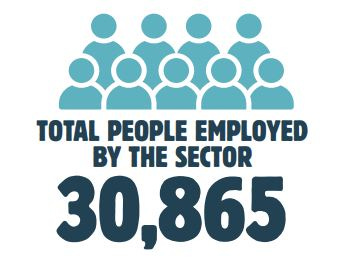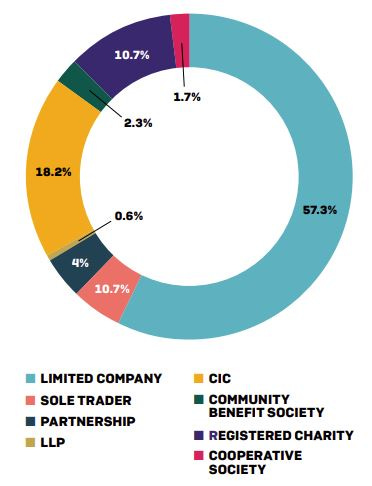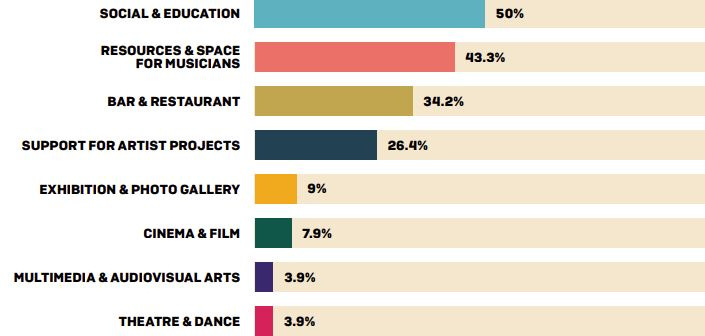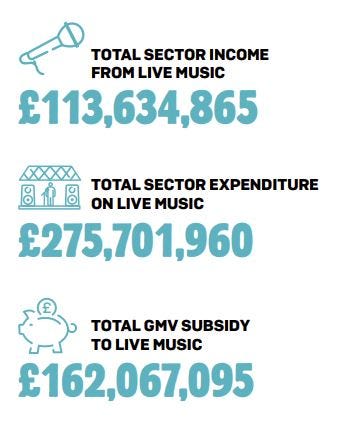What’s Happening Out There?
We all know it’s tough time for grassroots venues, artists and promoters. But what exactly does that look like, and in among the challenges, what about all the great stuff still being done?
This is a companion article to my initial thoughts on the Music Venue Trust Annual Report 2024 which I published earlier this week. You can read that HERE, or watch my speech in parliament about it HERE, but most importantly you can, and should, download the report and learn all about the grassroots music venue sector in 2024 HERE.
A lot of time, and let’s be honest even in this article I am going to be forced to return to it, those of us who really care about the grassroots live music ecosystem are compelled to spend a lot of time talking about the challenges facing GMVS, and trying to frame those problems with clear data and evidence that points to solutions that are achievable. That conversation is always about the negatives, how difficult it is to keep one of these venues open, and never about how fantastic and incredible each one is in its own right, and the brilliant work they are doing in their communities
Despite the tough last decade, there are still over 30,000 jobs in this vital part of our creative industries. That’s 30,000 dedicated, passionate people, from the bookers to the sound engineers, the box office staff to the young person who has just started their career by meeting and greeting the bands, working day in, day out, to keep music live in our towns and cities. Everyone who believes in vibrant communities full of culture and creativity owes those 30,000 people a huge round of applause – they are getting on with the job of bringing music to people every day and they have earned and deserve the support of their communities, the music industry and the government.
One third of all the remaining GMVS in the UK are now operated under a not-for-profit structure. That’s up from one in 34 venues in 2014 to one in 3 venues in 2024. It’s an astonishing transformation, and Music Venue Trust is very proud to have led the way in supporting venues to understand the work they are doing, how it should be framed, and the best structures to properly represent it to government, industry, audiences and artists.
Over half the UK’s venues offer social and educational projects encompassing cultural initiatives, community work, and courses. Over 43% provide resources for artists, including rehearsal space and recording studios. Let’s detail that a bit; of the 810 spaces we are describing solely as GMVs, 349 of them are actually fully active music hubs, supporting not just the public facing live music, but the production facilities for artists that result in that live music and the recording of it which supports the recorded, publishing and streaming sectors. 1 in 4 of the venues actively invests into other services for artists, supporting touring costs, providing promotional support, running record labels. If any one of those 349 venues closes, the community doesn’t just lose access to live music, which is terrible each time it happens anywhere, artists lose access to a whole range of services which support their careers to develop and grow. That’s not just a disaster locally, it’s a disaster for our national music scene. We haven’t just plucked this description out of the air; these really are the Research and Development labs for the creation of the next wave of great British talent.
That investment in our communities and in artists also has a financial value, and it’s in this report. In 2024, GMVs invested over £270 million into music but raised only £114 million in ticket sales. This represents a subsidy into the grassroots music sector to the tune of more than £160 million. It’s an astonishing increase in the amount of money these venues are raising to put behind music in our communities having more than doubled in the last five years, as the cost of staging live music has arisen and as venues have taken on more responsibilities to support it with things like those rehearsal and recording opportunities. Lou Reed was wrong: Electricity does not come from other planets. It comes from private energy companies making huge profits, who have increased the power bills of grassroots music venues by over 400% in the last 2 years.
The Annual Report 2024 is really instructive about where we are as a sector. It lays out the multiple challenges, the fantastic services and facilities the network provides, and you should read it and make sure other people read it. Most of all, you should read it as a statement of where we are now and where we could be if the Culture Media and Sport Select Committee Report of May 2024 was adopted in full by this government. So, let’s turn to that report and see what it says is needed. Let’s mark our report cards, for the industry and the government, and see where we have got to.
Obviously, the big talking point of that report, and of the government’s response to it in November, is the grassroots contribution, also called the arena and stadium levy, or the live music tax, depending on who you talk to and what mood they are in that day. The whole grassroots sector is now united in demanding that this contribution into our work must come into being during 2025, and we are very grateful that Culture Minister Chris Bryant and his team have been taking a forceful approach to ensuring this happens. There’s some disagreement about the best way to get there, but currently we find ourselves perfectly aligned with DCMS and the Culture Minister: Let’s try to make it a voluntary contribution, led by the biggest companies in the world and supported by everybody in the value chain of our biggest events, from the arena operators and the multinational promoters to the artists. No one constituent of that value chain should be making that voluntary contribution choice alone, nor expected to front it, or be the sole decision maker on it, or talking the financial liability for it. The voluntary levy will work if the biggest companies with the most control over these events decide this is their R&D contribution, cost it into their event, and ensure everyone is on board. And if they can’t bring themselves to do that for all the multiple positive reasons about their own future prosperity, the talent pipeline, and the aspiration created by easy access to live music in our communities, they should do it because they would really, really hate being put under a statutory regulator to deliver a statutory levy. On behalf of government, Chris Bryant has told you outright and bluntly; the government will do that if they have to, but currently he believes the industry when they say he won’t need to.
The industry then: Scorecard one year ago in January 2024, with apologies for the many people in that industry who really tried incredibly hard and who have supported MVT and joined our calls for change, a shameful zero. Sorry, that’s the reality. We are a results-based organisation, not just here to tell you the nice things when they happen. Scorecard today… I’m going to give the industry a 5 for effort and words, and the promise that if they deliver what they say they will I will happily stand-up next year and give them a 10 out of 10 and a big gold badge with ‘We did it’ inscribed on it. On the CMS Select Committee Report recommendation for a grassroots contribution, the industry finally seems to be there, and the government certainly is. That’s happening, now we just work out how and when.
But the CMS report wasn’t just about the levy. That grabbed headlines, but it wasn’t the limit of what the report said. These are the other recommendations, and this is where we are with them.
The report said, and the government response agreed with this description, that grassroots music venues are the research and development wing of the live music industry. And it went on to say that you don’t tax R&D, you create tax incentives to support it.
Now, people in the grassroots sector are not idiots. We can read the papers, and we know that this government came into power with a lot of financial challenges. The CMS Select Committee report says that to promote this R&D sector the government should reduce pre-profit taxation on it. You can run that inquiry again this year, and next year, and the year after that, and whoever is on the committee and whatever approach you take to analysing the sector it’s always going to tell you the same thing about pre-profit taxation on R&D: It’s a terrible idea, don’t do it. Every pound you take our of an R&D system in taxes is a pound that could have been invested in creating new talent, more jobs, more IP. Don’t do it. And if you are doing it, stop doing it.
The CMS Report says to explore ways to reduce Business Rates. I could do an hour-long speech about the stupidity of the Business Rates system, but let’s save that for some time when we are together in a pub. It’s counter intuitive to impose pre-profit premises taxes on these R&D spaces, and the CMS Report says the government should lower or eliminate them. It’s a hard financial climate right now, and the government didn’t feel they could do it. Premises Taxes on GMVs will go up in 2025/26, with the hope that they may finally be addressed in 2026/27 with a review in 2025/26. The increase is valued at £7 million across the sector. Read the Annual Report; the venues simply don’t have the money. Business Rates: It’s not resolved, it’s parked. Score card…honestly, 3 out of 10 because a review is coming and there’s a chance to get it right, but zero out of 10 for this year. Actively moving in the opposite direction from what everyone accepts needs to be done.
The CMS Report says that it is counter intuitive to place pre-profit taxes, in the shape of VAT, on live music tickets at grassroots, R&D level. It’s a tough financial climate right now, and the government didn’t feel they could cut it as the report recommends. Ultimately, when the financial conditions are right, the government will have to revisit that decision because the case is unequivocal and it’s clear. We have the highest taxation on the sale of live music tickets at grassroots level of any music producing nation. It’s double that in Germany, quadruple that in France. Norway doesn’t tax these tickets at all. It makes no sense to take money out of R&D and into treasury in a moment in the economic calendar when government is laser focused on growth. Cut the VAT, get more Adeles and Ed Sheerans. That’s the sensible deal on the table for any government when it wants to take it. And I’m sure plenty of people from the wider industry will tell you that you’re going to have to cut VAT on all live music tickets eventually, because the biggest artists in the world are already making decisions about where to play and any kind of punitive tax regime means they will choose to play elsewhere. Score card… this problem won’t go away and it can’t be ignored. It’s when not if, so a very generous 2, assuming that there are people in government that know this but feel that it’s just not the right time to do it.
What else did the CMS Report recommend? A statutory right of consultation on planning applications impacting on GMVs and legislation to enforce Agent of Change. Government decision at the moment; no. Again, read the report. We are very good at what we do, with my exceptional team at Music Venue Trust winning 97.6% of planning objections they are forced to lodge. Work with us to deliver the recommendations and we can lower those objections to none because better housing and development will be standard. Score card…. Sorry, we want to work with government, but the recommendations are clear, sensible, achievable, and yet they aren’t acting on them. No commitment to look again at this, so I guess it’s a zero unless someone in the government is reading this and starts the process of working with us to get a sensible planning system in place that actually promotes good development near live music spaces.
The fan led review. Not right now says the government. It’s needed anyway, and we are pleased to be working alongside the whole of the music industry and in association with the Metro Mayors to deliver the first stage of this which will be announced very shortly. We are starting without the government; they should feel free to join in. Score card… I don’t know. How do you mark something that someone hasn’t submitted an answer to?
Meanwhile, the tough financial climate has compelled the government to look at raising funds from businesses. The impact of the National Insurance changes will be felt most deeply by companies and organisations operating in the gig economy, and there aren’t any businesses or organisations more reliant on that then the places where actual gigs take place. If these venues acted differently, taking bad management decisions that impact terribly on individual workers, they could probably try to reduce the financial impact by becoming terrible employers. Meet me in the pub if you want me to explain how they could do that, because I’m not giving out public clues to unscrupulous employers on how to manage a poorly designed tax system. But venue operators won’t do that, because being a terrible employer isn’t why anyone runs a GMV. The NI increases alone create an additional tax demand of £15 million when venue operators decline to take the option to treat their staff poorly. Government taxes should never provoke bad employment practices, and in this case the law of unintended consequences applies. I’m not suggesting Treasury set out to make things even harder for your local music venue, but it’s pretty clear that they simply did not know how employment in the sector works, resulting in them bringing thousands of people into the scope of National Insurance who were never there before and really don’t belong there.
So, that’s the scorecard. What shall we go for? An average 2 to 3 points out of a possible 10? As it stands, the government has responded to multiple opportunities to remove problems in the sector and create opportunities in the sector with an approach that essentially says, ‘it’s not the right time for us, but it is the right time for the industry’. Looking across the whole economy, it’s not difficult to justify that position RIGHT NOW on the basis of all the other economic headwinds. But we need a very strong commitment to deliver on these opportunities when the time is right.
There is a huge opportunity for growth in this sector. The industry looks like it is prepared to play its part in delivering that growth. In one year’s time there will be our next Annual Report, and I want to be able to tell you that this government, this Secretary of State and this Culture Minister, are going to seize all these opportunities and work with Music Venue Trust to deliver the grassroots sector that fans, artists, audiences and communities are crying out for.
When it comes to the campaign to protect, secure and improve the UK’s grassroots music venues we now have a comprehensive set of answers to the challenges they face. Create investment from the wider industry, lower pre-profit taxation, use the planning, policy and legislative framework to create proper protections for them, restructure public funding so that their role is adequately recognised and rewarded. This isn’t pie-in-the-sky stuff, it’s basic economic literacy.
The central question of whether we can actually Save Our Venues has a new working atmosphere. Can we do it? Yes we can, and eventually we will. It’s up to this government to take the actions that will get us there, and up to this government to decide when that will happen.
It’s no longer a question of if we can save these venues. It’s a question of when this government will choose to do it.






Really good article Mark. Fascinating read when looked through the lens of a different market with similar challenges. And always so much more powerful when backed up by real data.